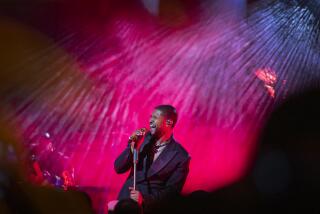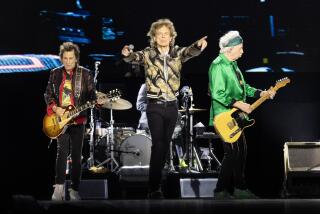POP MUSIC REVIEW : 3 Bands Prove Squeaky Clean but Little Else at Coach House
- Share via
SAN JUAN CAPISTRANO — What’s happening to rock, anyway? The three acts on stage Wednesday night at the Coach House all looked so fresh and clean cut that they could get day jobs at Disneyland.
With his neatly slicked hair and pale, angular looks, Paul Marsh, lead singer of the headlining Mighty Lemon Drops, could have been Alfalfa’s slightly older brother. Folk-rocker John Wesley Harding had the manner and appearance of a cheeky preppie. And the four members of the Ocean Blue looked so young and scrubbed that one wondered whether they get checked for hall passes every time they get off the tour bus.
Maybe these three Sire Records acts should put in a command performance for the growing number of state legislatures that are interested in putting restrictive labels on rock records. Who would vote to censor the boy next door?
Come to think of it, maybe they should leave Harding off of that particular junket. Although playing solo, the British newcomer was the only act on the bill to show much edge or personality (for that matter, he was the only act not in a total fog--the Lemon Drops and the Ocean Blue both feeling compelled to perform blanketed in prodigious billows of stage smoke).
Harding (real name Wesley Harding Stace) was cheeky all right, irreverently dropping pop star names in all directions during asides in his half-hour set. He also had a frontal attack on pop pretentions in a heavy-handed but effective spoof about Live Aid (“We are the world, we are rich bastards/We are the ones who drive flash cars and don’t pay taxes”).
There was no point, though, to another satiric number that poked fun at Jacques Cousteau, of all people. Harding’s verbal precocity grew wearisome on this rockabilly clunker, which he played on an out-of-tune electric guitar. It’s one thing to mock Phil Collins as “an average chappie,” but archly referring to a French deep-sea diver as “frogman” is poor policy at a time when rock is growing increasingly mired in unkind slurs. See how this questionable bit of John Bull humor plays in Paris or Quebec, J.W.
Harding did better when he quit trying so hard to be witty. The set’s highlight was “Spaced Cowgirl,” a ballad with a complex blend of compassion, anguish and condescension for a woman losing her grip.
Like a lot of newcomers, Harding has yet to commit the necessary, figurative assassination of his influences. In his vocal style and tone, and in his songs’ quick torrent of imagery and word play, he was a virtual mirror of Elvis Costello. Harding styles himself as “the groom” in a song about his arrival on the rock scene, but until he finds his own distinctive voice, he’s asking all of us Costello fans to become musical bigamists.
The Mighty Lemon Drops also seemed fixed at times on a better-known precursor. Their hourlong set included four different songs with grooves and melody lines traceable not just to the Doors, but to a single Doors song: “Break On Through.” Those four happened to be some of the most propulsive songs the British band played.
While the Lemon Drops tossed out some tasty pop hooks and managed a strong rhythmic surge when they weren’t playing turgid ballads, the show quickly fell into sameness. For one thing, the songs about romantic longings, failures and ecstasies were rote affairs that didn’t catch hold emotionally. For another, the band, which has been around since 1986, has yet to develop a performing personality (hence the need for smoke, strobe lighting and--in a club!--a green laser beam during a rushed encore rendition of the Rolling Stones’ “Paint It Black”).
Front man Marsh never reached out to the audience. Rather than kill time in some entertaining fashion during a short pause to fix a snare drum, he and his cohorts turned their backs to the audience and watched the repairs. It was a telling moment from a reasonably proficient but faceless band that had tang in name only.
Judging from its textured, anglicized sound, the Ocean Blue, from Hershey, Pa., must have grown up eating English toffee instead of the hometown product. The four-member group’s pillowy weave of synthesizers and rippling guitar proved to be an inviting backdrop for reverie, with a sturdy rhythmic spine and a knack for the occasional melodic hook helping to sustain interest during long, dreamy passages.
Eventually, though, too many soft musical colors and murmured vocals led to sameness. The Ocean Blue did go for some dynamic contrasts, but it failed to generate the sense of gradually building tension and climactic release that works for the Feelies, a band of similar concept but far greater impact.
More to Read
The biggest entertainment stories
Get our big stories about Hollywood, film, television, music, arts, culture and more right in your inbox as soon as they publish.
You may occasionally receive promotional content from the Los Angeles Times.











